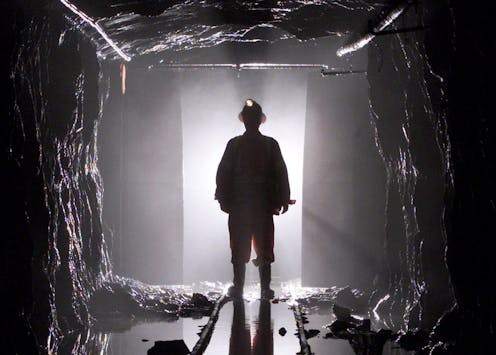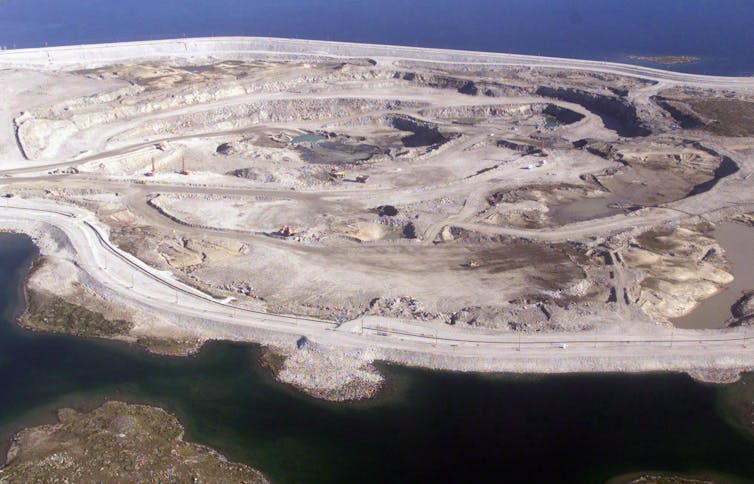
When you think diamonds, you probably think of romance, weddings and Valentine’s Day. And it’s no accident we think this way: A century of marketing has convinced us that diamonds symbolize love.
In Canada, magazine ads celebrate the “purity” of Northern Canadian diamonds as an ethical alternative to conflict diamonds.
But this marketing strategy actually hides enormous social problems that people connected to the mines say they’ve experienced. This includes some of Canada’s highest rates of violence against women.
The story our guests tell today is not one of numbers. Instead, they’re sharing narratives gathered and collected through interviews and sharing circles about how lives have changed after the mines opened.
Since diamond mining started in Canada in 1998, Canada has become the third-largest producer of diamonds in the world. In 2019, the inquiry into missing and murdered Indigenous women and girls linked resource extraction to spikes in violence against women.
On today’s episode of Don’t Call Me Resilient, I chat with Rebecca Hall, assistant professor of global development studies at Queen’s University and the author of Refracted Economies: Diamond Mining and Social Reproduction in the North.

Hall said this in our interview:
“A mine comes to town and all of a sudden it has this huge presence. And you see flyers everywhere trying to recruit workers, but then just as quickly as it comes, it can go. So once again you got disruption upon disruption. All of these things taken together can create the conditions for gender violence.”
Joining in on the conversation is Della Green, former victim services co-ordinator, at the Native Women’s Association of the Northwest Territories.
Green said this about how she felt after she first moved to Yellowknife and her husband went to work in the mines:
“I was so isolated and I couldn’t find anything that could support women. There was no programs. There was no get together. I was lost for the first little bit when I moved up there and I don’t know what it was like for other women, probably the same.”
One of the women Hall interviewed for her book told her, “Diamonds are said to be a girl’s best friend. I’m not sure which girls, because it’s certainly not anyone in here.”
Read more: Missing and murdered Indigenous women and girls: An epidemic on both sides of the Medicine Line
Transcript
An unedited transcript of the episode is available here.
ICYMI — Articles published in The Conversation
- Diamond mines in the Northwest Territories are not a girl’s best friend
- Mining push continues despite water crisis in Neskantaga First Nation and Ontario’s Ring of Fire
- Colonialism’s role in the overexploitation of natural resources
- Using maps as a weapon to resist extractive industries on Indigenous territories
- Missing and murdered Indigenous women and girls: An epidemic on both sides of the Medicine Line
- ‘End the genocide’: Little action on MMIWG calls for justice in the 3 years since the national inquiry concluded
- Two years after the MMIWG report, targeted work must move urgently ahead
- People in abusive relationships face many barriers to leaving — pets should not be one
Additional reading + listening
- Refracted Economies: Diamond Mining and Social Reproduction in the North, by Rebecca Hall
- “Diamonds are Forever: A Decolonizing, Feminist Approach to Diamond Mining in Yellowknife, Northwest Territories,” a dissertation by Rebecca Hall
- “Missing and Murdered Indigenous Women and Girls Final Report”
- Keetsahnak / Our Missing and Murdered Indigenous Sisters, edited by Kim Anderson, Maria Campbell and Christi Belcourt
- “Out of Sight, Out of Mind,” a report by Amnesty International
- “My pain: The struggle to report sexual abuse around the Zimbabwe diamond industry,” by International Co-operation for Development and Solidarity
- Mining company, women’s council jointly confront intimate partner violence, by Simon Whitehouse in NNSL Media
- “A rights-based approach to indigenous women and gender inequities in resource development in northern Canada” in Reciel, by Konstantia Koutouki, Katherine Lofts and Giselle Davidian
- “All That Glitters: Diamond Mining and Tåîchô Youth in Behchokö, Northwest Territories” in Arctic, by Colleen M. Davison and Penelope Hawe
- “Gendered social media communication around mining: patriarchy, diamonds, and seeking feminist solidarity online” in Gender & Development, by Juliet Gudhlanga and Samuel J. Spiegel
Follow and listen
You can listen to or follow Don’t Call Me Resilient on Apple Podcasts, Google Podcasts, Spotify or wherever you listen to your favourite podcasts. We’d love to hear from you, including any ideas for future episodes. Join The Conversation on Twitter, Facebook, Instagram and TikTok and use #DontCallMeResilient.
Don’t Call Me Resilient is a production of The Conversation Canada. This podcast was produced with a grant for Journalism Innovation from the Social Sciences and Humanities Research Council of Canada. The series is produced and hosted by Vinita Srivastava. My co-producers are: Haley Lewis, associate producer Vaishnavi Dandekar and sound producer Lygia Navarro. Reza Dahya is our sound designer. Jennifer Moroz is our consulting producer. Lisa Varano is our audience development editor and Scott White is the CEO of the Conversation Canada.
This article was originally published on The Conversation. Read the original article.







